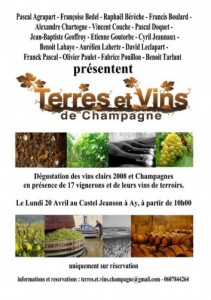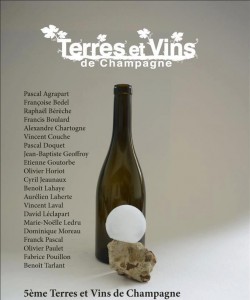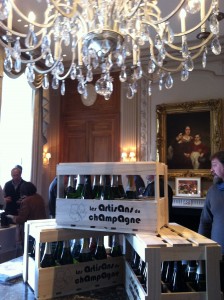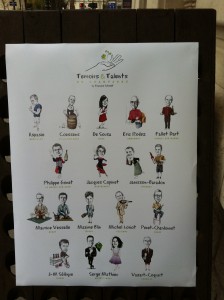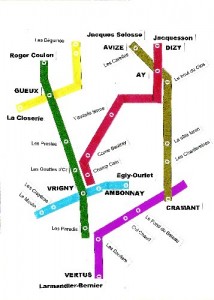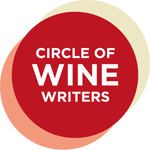
This article first appeared in Circle Update on 31st May
Traditionally, the Champagne region did not play host to such tastings which makes sense considering champagne is in essence a blended non-vintage wine. It furthermore is not a wine which is sold either en primeur or as an investment, instead it is very well established as the wine of choice for celebrations and special occasions. Add to this that vins clairs (still champagne wines) are not the easiest to understand and the fact many chef de caves believe that the elaborate second fermentation process, the aging time & dosage have at least as much influence on the final result as the initial blend and one can easily see why Champagne shied away from these early vintage tastings.
But things started to change in 2009 when a few like-minded Champagne growers decided to create the group “Terres et Vins de Champagne”. Aurelien Laherte, one of the founders, told me the project grew out of a desire to share the still wines behind the Champagne as a means to show off the different terroirs. “We already often met to discuss more alternative viticulture practices and to compare notes on our different expression of the terroir. As we regularly received requests from journalists, buyers and champagne lovers to come and taste our still wines we thought organizing a group tasting would be a fun and unique way to present our vins clairs and new champagnes to these people”.The first Terres et Vins de Champagne event took place on the 20 April 2009 and really focused on showing off the vins clairs more than the Champagnes. The first tasting had about 220 attendees; mostly professional and about 20% came from abroad.
The 2010 edition was even more successful with more international visitors. This year was the 5th edition of the tasting and registrations were capped at 400 people.The group has also grown in numbers over the years; Olivier Horiot was the first additional member in 2011, in 2012 Domique Morreau (Champagne Marie Courtin)was added and this year Vincent Laval and Marie-Noelle Ledru joined the group to make up the 21 members.This first official vins clairs & champagne tasting drew a lot of interest from other growers in champagne who saw the potential of this kind of event. Two of them, Gilles Lancelot and Jérôme Dehours first tried to join the Terres et Vins group in 2010 before they decided to create their own event the day after Terres et Vins de Champagne in 2011. According to Dehours they realized that whilst they really liked the concept they did not always see eye to eye with the established group and thought it would be better to create a similar yet different event the day after Terres et Vins de Champagne. “Artisans de Champagne is a group of artisan winegrowers formed around the desire to share their vins clairs and cuvees with a wider audience. We decided to hold our tasting just after the Terres et Vins tasting as we felt that having the two tastings together made sense for people who travelled from further afield”.
Artisans de Champagne has also been growing in numbers as they added Rodolphe Peeters and Jean-Sebastien Fleurie to the existing member list of Nicolas Maillart, Antoine Paillard, Frédéric Savart, Jean-Paul Hebrart, François Huré, Pascal Gerbais, Yannick Doyart, Christophe Contstant (Champagne Vergnon), Arnaud Margaine, Laurent Champs (Champagne Vilmart), Gilles Lancelot, Jérôme Dehours, Xavier Gonet-Medeville. Rodophe Peeters told me he had joined the Artisans de Champagne this year because he was attracted by the emphasis of the group on the notion of the “footprint of the winemaker” which according to Peeters is just as important as the notion of terroir.In 2012 two more groups were formed and both held a similar vins clairs and champagne tasting event to coincide with the 2 existing tastings.
Terroirs et Talents de Champagne is the brain child of Cyril Janisson-Baradon and it is in a way also with him that the idea of the Grands Jours de Champagne was born. Janisson-Baradon was fully aware of the interest the 2 existing tastings had generated and he knew a third vins clairs & champagne tasting could only add to this. “I knew that to get the attention of the people descending on the region we had to put on a similar yet different event – a little bit like it is done in Burgundy.”
He carefully chose his colleagues from 14 different villages to show of the diversity in the Champagne terroirs. In order to better explain the subtle differences of soils he also invited Geoffroy Orban, a geologist, who is specialized in the unique expressions of minerality of stone and rock formations in Champagne.
Terroir et Talent de Champagne decided to hold their tasting the Sunday before Terres et Vins de Champagne. For its second edition a new member was added (Eric Rodez) and the tasting hours were extended to Monday morning. By having longer opening hours Talents et Terroirs de Champagne hoped to attract more visitors. Their main focus is the international audience – according to Jean-Pierre Vazart the biggest advantage of the tasting is the international visitor. “A lot of us do not export enough so it is a great opportunity to be able to show off our wines to a wider international audience and make valuable export contacts.” Attracting more international press and buyers was also the reason why Terroirs et Talents de Champagne took a stand at Prowein a month before the event. It seems their efforts paid off as English was definitely the leading language at their event. Trait-d’Union, the smallest of the groups, also saw the light last year; Anselme Selose, Pierre Larmendier, the Chiquet brothers (Champagne Jacquesson), Francis Egly , Eric Coulon and Jérôme Prévost are above all old friends and probably the biggest “star” winegrowers of the region. They have been focusing on single vineyard and terroir wines for several decades and have built up a loyal international following. No wonder then that last year’s Trait-d’Union event was overbooked. Yet Trait-d’Union did not organize a tasting this year. According to Jean-Hervé Chiquet the group will only organize their vins clairs and Champagne tasting every two years. “Les Grands Jours de Bourgogne only take place every two years – why then should we have a yearly event in Champagne?”Last year, the murmurs of the “Grands Jours de la Champagne” started. At that time Frédéric Savart told me that the Artisans de Champagne tasting would move to the posh Crayeres Hotel and Restaurant, as “this would make it easier for Houses to join in”. He continued by saying that it would be great for Champagne to have a week-long event where growers, co-operatives and houses could show off their latest developments. “It is important everybody and especially the Grande Marques participate, as they are still the bill board for our region; with them on board these events will draw a lot more attention”.
However, we noticed that this year the Grandes Marques participation only went as far as attending some of the tastings. In fact Alfred Gratien, a House which had been part of the Artisans de Champagne group did not participate in this year’s events. According to Gilles Lancelot, Nicolas Jaeger had been reprimanded by the UMC (Union de Maison de Champagnes) and asked not to participate in growers tasting. Lancelot added “We hope that the increased interest and attendance will entice the UMC to allow their members to participate in our tastings and are looking forward to welcoming Nicolas back to our group.”
And indeed the tastings did draw a lot of interest. More than a thousand people registered for the events. Both Terres et Vins de Champagne and Artisans de Champagne had to turn down people and all three tastings were packed. Visitors often traveled extensively (eg from Australia, the US, Canada, Brazil or Japan) to discover Champagne’s latest terroir driven trends and cuvées in the making. But there also was a lot of local interest; besides the usual store owners and sommeliers, senior members of the CIVC and chef de Caves attended.
Add to this the emergence of several “off” events, always a sign of success in France. Examples of some “off” events included a private tasting at Dom Perignon, a press tasting at Champagne Philipponnat, an importers tasting at Champagne Selosse and the launch of the new cuvée prestige “Sapience” at Champagne Marguet.
All of this off course fueled the “Grands Jours de Champagne” speculation to the point that quite a few trade people believe that it will be inevitable that the houses or at least some of the Grandes Marques will organize a similar event around the same time in the next few years. And when this happens Champagne will have its “Grands Jours” in the true sense of the word.
I wrote this article originally for the Circle Update , published 30 May 2013.

